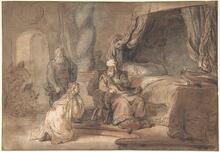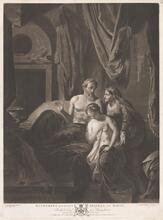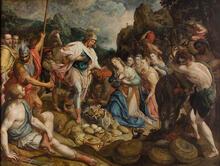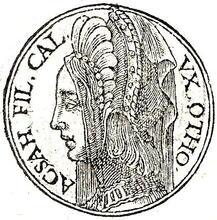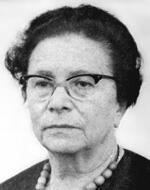Abishag: Bible
"David and Abishag," by Pedro Américo, 1879. From the Museu Nacional de Belas Artes, Rio de Janeiro, via Wikimedia Commons.
Abishag is an unspeaking Bible character involved in the story of the power struggle between King David’s sons immediately before and then after David’s death. Abishag is originally brought to David to lie in his bosom and keep him warm as he nears death. She is present for a conversation during which David’s wife Bathsheba convinces David to name her son Solomon as his successor. When Adonijah, the son of David’s fourth wife Haggith, asks King Solomon for Abishag’s hand in marriage, Solomon responds violently. Abishag is a tool to move along the plot concerning Solomon and Adonijah; she is used to convey the importance of male honor, as Solomon asserts his right to determine the sexual fates of the female members of his household.
Article
When King David (reigned c. 1005–965 BCE) ages and his health fails, a beautiful young woman is sought throughout Israel to lie in his bosom and keep him warm. The king does not have sexual relations with Abishag (I Kgs 1:4). This physical impotence mirrors his political impotence; the next verse reports the premature claim of his son Adonijah (son of his fourth wife, Haggith) to his throne. Bathsheba, David’s major wife at this point in his life story, responds to Adonijah’s preemption by convincing David to name her son Solomon as his successor, in a conversation at which Abishag is also present (1:15). After the death of David, the temporary reconciliation of Adonijah and Solomon ends when Adonijah uses Bathsheba as an intermediary to request from the new king Abishag’s hand in marriage. Solomon responds violently, ordering Adonijah’s assassination (2:13–25).
The unspeaking Abishag is more a tool to move the plot along than a developed character: she marks first the inability of David to continue his rule and, later, the inability of Adonijah to assume that power. The latter incident has perplexed commentators: why would Solomon react so strongly against Adonijah’s marriage proposal? Many assume Adonijah makes a move on David’s harem and, thus, a symbolic claim to his father’s throne, although this seems to be an unlikely maneuver for a politically weakened man. This and other texts in which a king’s sexual partner(s) are seized by other men (2 Sam 3:6–11; 16:20–22) may reflect broader cultural norms regarding male honor and “the traffic in women”—the roles women play as mediators between men—rather than specific political claims. Solomon thus asserts his claim on his mother’s loyalty, and his right to determine the sexual fate of the female members of what is now his household, against Adonijah’s insinuations of status.
Fewell, Danna Nolan, and David M. Gunn. Gender, Power, and Promise. Nashville: Abingdon Press, 1993.
Meyers, Carol, General Editor. Women in Scripture. New York: Houghton Mifflin, 2000.
Stone, Ken. “Sexual Power and Political Prestige: The Case of the Disputed Concubines.” Bible Review 10 (1994): 28–31, 52–53.


